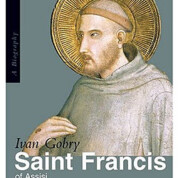
by Ivan Gobry (from St. Francis of Assisi: A Biography; Ignatius Press, 2006)
The sentiment that would carry Francis away and govern the founding of his religious order was, from the very first moment of his conversion, a delirious love for Christ. Not a contemplative love, which is satisfied with a perceptible, mental vision of the Savior, which dwells at length upon his words and his sufferings, but rather an active love. Of course, Francis habitually possessed that contemplative fervor, too, as all of his biographers assure us. Bonaventure writes: “He devoted such an ardent love to Christ, and his Beloved showed him in exchange such a familiar tenderness, that the servant of God had almost continually before his eyes the physical presence of his Savior.”
And we find, in one of his prayers, the accents of all the great mystics: “Lord, I beg thee, let the burning, gentle power of thy love consume my soul and draw it far from everything that is under heaven, so that I may die for love of thy love, O thou who hast deigned to die for love of my love.”
Furthermore, this is the desire that he expresses for Christians in general, in a sort of “encyclical letter” that he wrote entitled, “Letter to All the Faithful”. To those who truly love Christ, he promises that they will be his spouses, his brethren, and his mothers:
We are spouses when the faithful soul is united to Jesus Christ through the Holy Spirit. We are his brethren when we do the will of his Father who is in heaven. We are his mothers when we bear him in our hearts and in our bodies through our love, through the purity and fidelity of our conscience, and when we give birth to him by the performance of good deeds, which should be a light and an example for others. Oh, how glorious and holy it is to have such a Father in heaven! Oh, how holy, beautiful and amiable it is to have a Spouse in the heavens! Oh, how holy and precious, pleasing and humble, peaceful and sweet, lovable and desirable a thing it is, surpassing all else, to have such a Brother!
We find the same accents in the writings of Clare, the perfect disciple of Francis, for instance, in a letter to Agnes of Bohemia, who had become the abbess of the convent in Prague:
Happy indeed is she to whom this is granted a place at the divine banquet, for she can cling with all her heart to him whose beauty eternally awes the blessed hosts of heaven; to him whose love gladdens, the contemplation of whom refreshes, whose generosity satisfies, whose gentleness delights, whose memory shines sweetly as the dawn; to him whose fragrance revives the dead, and whose glorious vision will render all the inhabitants of the heavenly Jerusalem blessed.
The 1221 rule had enshrined in its text the duty to belong to Jesus Christ:
Let us not desire anything else, let us not want anything else, let nothing please us or give us joy except our Creator, Redeemer, and Savior, the one true God, who is the fullness of Good, the complete and total Good, the venerable and supreme Good, who alone is good, merciful and kind; who alone is just, truthful and right; who alone is beneficent, innocent and pure; from whom, through whom, and in whom is found all pardon, all grace, all glory for the repentant and the just, and for all the blessed who rejoice with him in heaven.
With Christ, Francis could give free rein to his poetic sensibility. But poetry is not good form in a canonical document, and so that exhortation was deleted from the definitive rule.
Now the love of Christ compels the soul and draws it into a service which is preferential, exclusive, and unconditional. Saint Bonaventure could write, “One word sums up all of Francis: faithful servant of Christ.” As a servant, he was entirely subject to his master, as called for in the prayer that concludes his “Letter to the General Chapter”:
Almighty and ever-living God, just and merciful Lord, grant to us miserable creatures, for your own sake, that we may know what you will, and that we may always will what pleases you; so that, externally purified and illumined within and inflamed with the fire of the Holy Spirit, we may follow in the footsteps of your dearly beloved Son, our Lord Jesus Christ, and by your grace alone may arrive at our destination in you, O Most High, who in perfect Trinity and utterly simple Unity live and reign and are glorified, Almighty God, unto ages of ages. Amen.
To follow Christ is not only to serve him, it is not enough to do his will; it also means becoming like him. This love is a love that consists not only in doing, but in being; a love that thrives not only in activity but in the person. Francis, without having read the Fathers of the Church, follows their teaching in this: Origen, Athanasius, and Gregory of Nyssa demonstrate how the Son is the mediator of the Father: God created man in his image, in a state of perfection; original sin corrupted that image, and the Son, who is the perfect image of the Father, came both to reveal God to us and to teach us the way leading to the restoration of his image in us.
